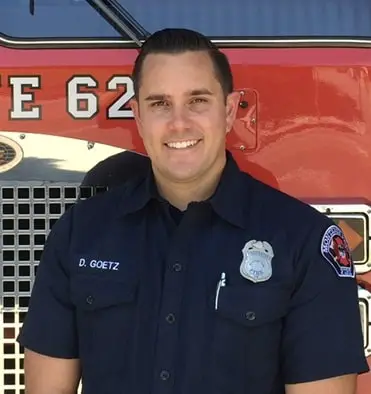Salary, Job Description, How To Become One, and Quiz
.jpg)
Municipal Firefighters
Municipal Firefighters control and extinguish municipal fires, protect life and property and conduct rescue efforts.
Table of contents
What they do
Municipal Firefighters control and extinguish municipal fires, protect life and property and conduct rescue efforts.
- Search burning buildings to locate fire victims.
- Rescue victims from burning buildings, accident sites, and water hazards.
- Administer first aid and cardiopulmonary resuscitation to injured persons.
- Dress with equipment such as fire-resistant clothing and breathing apparatus.
Typical day
On a daily basis, Municipal Firefighters clean and maintain fire stations and fire fighting equipment and apparatus. They participate in physical training activities to maintain a high level of physical fitness.
A typical day for a Municipal Firefighter will also include:
- Drive and operate fire-fighting vehicles and equipment.
- Dress with equipment such as fire-resistant clothing and breathing apparatus.
- Respond to fire alarms and other calls for assistance, such as automobile and industrial accidents.
- Collaborate with police to respond to accidents, disasters, and arson investigation calls.
- Assess fires and situations and report conditions to superiors to receive instructions, using two-way radios.
Other responsibilities
Besides their typical day, Municipal Firefighters also participate in fire drills and demonstrations of fire fighting techniques. They may also participate in courses, seminars, and conferences, and study fire science literature, to learn firefighting techniques.
On a weekly to monthly basis, Municipal Firefighters lay hose lines and connect them to water supplies. They might also select and attach hose nozzles, depending on fire type, and direct streams of water or chemicals onto fires.
In addition, they collaborate with police to respond to accidents, disasters, and arson investigation calls.
Although specific duties may vary, many of them dress with equipment such as fire-resistant clothing and breathing apparatus.
To some Municipal Firefighters, it is also their responsibility to respond to fire alarms and other calls for assistance, such as automobile and industrial accidents.
What is the job like
Job satisfaction
Is this job meaningful
83% said they were satisfied with their job and 88% said they found their job meaningful.
Being a firefighter is the best job I have ever had. I would rather be at the station than be at home, and I consider my crew literally my brothers. Look at the job going in as a high stress janitor… We wash trucks, work on gear, and clean the station all day, with adrenaline … Read More
My name is David Goetz. I have worked for the Monterey Park Fire Department for 15 years, the last five having been an Engineer within the department. My typical day Typical is something we don’t tend to have in the fire service. We can have planned days but it is always subject to immediate and … Read More
Pros
Suitable for people who like practical and hands-on work.
Suitable for people who want to work in a supportive work environment.
This career is perfect for people who love to work both indoors and outdoors.
It is not too difficult to get into this career. Previous work-related skill, knowledge, or experience is required for this career.
Cons
Not suitable for people who like to follow routines.
Salary is below average.
Long working hours (More than 40 hours per week).
How much do they make
Average salary
Average hourly wage
Entry-level Municipal Firefighters with little to no experience can expect to make anywhere between $26,940 to $35,850 per year or $13 to $17 per hour.
| Salary by experience | Annual | Hourly |
|---|---|---|
| Highest (Top 10%) | $93,790 | $45 |
| Senior (Top 25%) | $70,870 | $34 |
| Median | $52,500 | $25 |
| Junior (Bottom 25%) | $35,850 | $17 |
| No experience (Bottom 10%) | $26,940 | $13 |
This table shows the top 10 highest paying industries for Municipal Firefighters based on their average annual salary.
| Salary by industry | Annual | Hourly |
|---|---|---|
| Spectator Sports | $70360 | $33.83 |
| Aerospace Product and Parts Manufacturing | $64060 | $30.80 |
| Ship and Boat Building | $59130 | $28.43 |
| Colleges, Universities, and Professional Schools | $59000 | $28.36 |
| Architectural, Engineering, and Related Services | $58840 | $28.29 |
| Facilities Support Services | $58420 | $28.08 |
| Local Government | $57490 | $27.64 |
| Support Activities for Air Transportation | $55100 | $26.49 |
| Federal Executive Branch | $54970 | $26.43 |
| State Government | $54670 | $26.28 |
View more salary by industries here.
Where can they work
Where can Municipal Firefighters work? Here is a table showing the top 10 largest employers of Municipal Firefighters including the average salary in that industry.
| Employers | Total Employed | Annual Salary | Hourly Wages |
|---|---|---|---|
| Local Government | 277370 | $57490 | $27.64 |
| Other Support Services | 13720 | $37020 | $17.80 |
| State Government | 9310 | $54670 | $26.28 |
| Federal Executive Branch | 7660 | $54970 | $26.43 |
| Other Ambulatory Health Care Services | 700 | $38780 | $18.64 |
| Investigation and Security Services | 520 | $40420 | $19.43 |
| Aerospace Product and Parts Manufacturing | 320 | $64060 | $30.80 |
| Facilities Support Services | 160 | $58420 | $28.08 |
| Scientific Research and Development Services | 140 | $50410 | $24.24 |
| Colleges, Universities, and Professional Schools | 110 | $59000 | $28.36 |
What is the work day like
Working hours
Working schedule
How often do you use email in this job?
Telephone
How often do you have telephone conversations in this job?
Group discussions
How often do you have group discussions in this job?
Public speaking
How often does this job require you to do public speaking?
Level of competition
How much competitive pressure is in this job?
What is the work environment like
Office-style environment
Indoors in an environmentally controlled condition
Warehouse-style environment
Indoors in a non-controlled environmental condition such as a warehouse
Outdoors
Outdoors exposed to all weather conditions
Outdoors – Under Cover
Outdoors but under cover (e.g. structure with roof but no walls)
How to become one
Difficulty to become one
Required level of education
What level of education do you need to perform the job?
Relevant majors
Wildland/Forest Firefighting and Investigation
Fire Prevention and Safety Technology
Fire Science/Firefighting
Environmental/Natural Resources Law Enforcement and Protective Services
Relevant work experience
How much related work experience do you need to get hired for the job?
On The Job Training
How much on the job training do you need to perform the job?
Should you become one
Best personality type for this career
People with this personality type likes practical and hands-on work. They prefer working with plants, animals, and real-world materials like wood, tools, and machinery.
People with The Builder personality type likes practical and hands-on work. They prefer working with plants, animals, and real-world materials like wood, tools, and machinery.
People with The Thinker personality likes to work with ideas that require an extensive amount of thinking. They prefer work that requires them to solve problems mentally.
People with The Artist personality likes to work with designs and patterns. They prefer activities that require self-expression and prefer work that can be done without following a clear set of rules.
People with The Helper personality type likes to work with people and in teams. They prefer work that allows them to build relationships with others.
People with The Leader personality likes to start and work on projects. They also like leading people and making many decisions.
People with The Organizer personality type likes to follow set procedures and routines. They prefer working with data and details more than with ideas.
You can read more about these career personality types here.
People who are suitable for this job tend to like work activities that include practical, hands-on problems and solutions. They like working with plants, animals, and real-world materials like wood, tools, and machinery.
They also like working with, communicating with, and teaching people. They like helping or providing service to others.
Take this quiz to see if this is the right career for you.
Work Values
Which values are the most important to a person’s satisfaction for this job?
You are someone who is results oriented. You prefer work that allows you to utilize your skills and abilities while at the same time giving you a sense of accomplishment.
You are someone who values job security, steady employment, and good working conditions. You also prefer work that keeps you busy all the time with something different to do every day.
You are someone who values job advancement and leadership roles. You prefer work that receives recognition for the work you do and jobs that are looked up to by others in the company and your community.
You are someone who likes to provide a service to others. You prefer a work environment where you can work with your co-workers in a friendly non-competitive environment.
You are someone who values a company that stands behind their employees. You prefer a work environment where everyone is treated fairly and is being supported by the company.
You are someone who likes to work on your own and make your own decisions. You prefer work that requires little supervision and are allowed to try out your own ideas.
Don’t know which career to pursue?
Take the career quiz to find careers that match your personality type.
Take The Career Quiz


.jpg)




.jpg)
.jpg)
.jpg)
.jpg)
.jpg)
.jpg)
.jpg)
.jpg)
